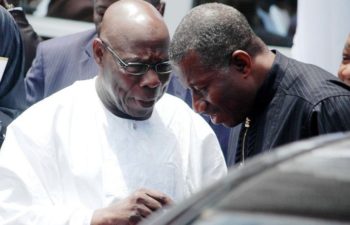It was an innocuous message posted on Facebook by a young married woman in her late 20s, who told her friends on social media of her intention to take to betting in order to make extra cash and sought advice on how to go about it. Many of her friends were shocked, as she has a thriving business and supportive husband. Some warned her not to dabble into it, while others offered advice on how to go about it with a caveat that she should not get hooked on a pastime that is gradually destroying the lives of many Nigerians.
Gambling, which has been rebranded from the old ‘Baba Ijebu’ that many of us are familiar with growing up, has transformed into a big business. It has been repacked as Sports betting and has enjoyed much patronage by four in 10 Nigerians. It is estimated that more than 60 million Nigerians are actively involved in sports betting in over 50 betting sites operating in the country. Arguably now a multi- billion dollar business involving Nigerians and expatriates, in the last few years, Sports betting has experienced and continues to record a massive surge in the country, consequently having a huge impact on the economy.
Nigeria has become the second largest online gambling market in Africa, behind South Africa, with a Gross Gaming Revenue of $58 million in 2018, according to a report by top accounting and auditing firm, PwC. What makes us the gambling capital in Africa is due to our large population far beyond that of South Africa.
Aside from that, the report projects that the GGR will rise by 16% over a five-year period. And with over 200 million people, it is believed that Nigeria will keep on supplying the population to feed the betting companies. Nigerians are passionate about their sports, especially football, and this has been extended into their love for sports betting. The fact that they can make money from the sport they love so much is extremely appealing and alluring.
The rise in sports betting has also been aided by improving technology, with many Nigerians now having access to mobile phones and affordable internet. You do not have to leave the comfort of your home before you can take part. It is also not restricted to the young ones alone, as adults, both male and female, are also hooked.
Unfortunately, the unemployment rate in Nigeria remains high, which has also contributed greatly to the rise in sports betting. Many Nigerians have lost hope of a better tomorrow and now believe that through gambling, they can hit the jackpot. It is not surprising that Nigerians plow about $5.5 million (N3.5bn) into sports betting every day, totaling an incredible $2 billion a year.
One of the betting companies in Nigeria known as Bet9ja is the biggest betting brand in the country, with a monthly turnover of $10 million as of 2016, according to a report by another accounting firm, KPMG. NairaBet isn’t doing badly either, with an estimated turnover of $3 – $5 million dollars every month. The betting companies have found a gold mine in Nigeria, and are expanding rapidly. They can be found on every street corner in Nigeria and you will see people milling around such spots, morning, afternoon, or evening. Without question, the business is booming because many Nigerians who have lost hope in the country now look towards Sports betting as an escape route out of poverty.
With their last N100, N500, or N1, 000, they troop daily to the betting centres, hoping to use gambling as a fortune cookie to turn their life story around for the better. As with all games of chance, some get lucky, while many are left in penury. Another interesting development in this booming enterprise is that the real players comprise mainly of young and upwardly mobile junior executives with multinationals and their counterparts in the public service that could place a bet with as much as one million naira.
Aside the fact that many young Nigerians are now hooked on sports betting, the phenomenon has also wreaked havoc on so many homes due to the addiction of many breadwinners to it. In their desire to hit the jackpot, they begin to neglect their immediate family's responsibilities, leading to squabbles on a daily basis.
Few years ago, a relative had to call my attention to the unusual behaviour of her husband who had taken to betting and in the process, started neglecting the home front. The distraught wife, while recounting her ordeal, said that her husband had spent over one million naira on Sports betting and that he was no longer attending to her's or their children's needs.
Of course, an addiction to online betting is not without its consequences. The most telling effect is on individual and family finances; bettors are almost always broke. More so, it impacts the relationships between gamblers and their friends and loved ones as well as reduces productivity at work and in life generally.
Two factors are responsible for increasing football betting among youths in Nigeria. One is the increase in poverty and unemployment rates. Among Nigeria’s estimated population of around 200 million, about 87 million are said to be extremely poor. The youth unemployment rate in 2018 was put at 36.5 percent. Many of our youths are without jobs, even the graduates among them, while many are involved in menial jobs to make ends meet while yet a large number are on drugs, fully involved in crime, or both.
There have been calls from religious clerics for government to criminalise betting, especially football betting. However, it is doubtful that the government has the political will to toe such a line. This is because the federal and state governments generate huge amounts of money from the activities of the betting companies through taxes and other sundry levies.
Apart from that, many betting companies have aided the Nigerian economy by forming partnerships and signing sponsorship deals with several organisations, both in the sports and entertainment industries. European bookmakers, 1xBet, have had partnerships with the Nigeria Football Federation as well as the League Management Company, while Bet9ja, up until early 2019, were title sponsors of the Nigerian National League, the second tier of the Nigerian league system. Bet9ja also has a multi-million dollar sponsorship deal in place with popular reality TV show, Big Brother Naija. Bookies have injected a lot of money in the Nigerian media, bankrolling several shows and events across radio and television.
Sports betting in Nigeria is not growing in isolation, but rather moving along with other industries, notably the banking, information technology and telecommunications industries. The inter-relationship between these sectors can best be described as symbiotic, with each benefiting from the other. It is true that sports betting has been aided by improving banking and payment systems; and technological advancement (accessibility to mobile phones and internet). Bookmakers now have affiliations with banks, payment gateways and telecommunications companies, leading to a significant increase in the activities in these sectors, and consequently boosting their revenue.
Imagine being charged N50 for every deposit you make via Quickteller or internet banking; or having N30 deducted every time you fund your account via the mobile USSD service. Now think about the millions of deposits made into betting accounts per day. That is some serious money we are talking about.
According to the Nigeria Inter-Bank Settlement System (NIBSS), there were 29 million web payments, worth N132 billion as far back as 2017.
As sports betting continues to grow at a meteoric rate, so will its effect on the economy. The companies have also provided jobs to thousands of Nigerians who serve as their agents and they are in all nooks and crannies of Nigeria.
However, besides the highlighted attendant benefits of the betting industry to the country, its drawbacks on those who are now addicted to gambling cannot be overemphasized.
According to Dr. Tiwatayo Lasebikan, a senior resident at the Federal Neuropsychiatric Hospital, Lagos, betting addiction is a mental disorder with potentially debilitating physical and psychological consequences. One of the classic signs is an intense and impulsive craving to try again and again.
Other signs include stealing and selling off properties or assets to bet, leading to the risk of the addict to taking bigger and bigger risks – signs that many young Nigerians are already exhibiting.
In the same vein, Dr. Adedeji Oyenuga, a Senior Lecturer in the Department of Sociology, Lagos State University (LASU), said betting is an addiction and not a means of livelihood. He noted that a person that wins a particular amount might end up losing the amount or much more again if he or she becomes addicted to it by becoming irrational for more wins and not acknowledging where to draw the line.
“You are not addicted to it when you do it once and get away with it. Those that engage in it on a regular basis are addicted to it. Even the owners of the betting companies or platforms don’t bet because they know that it is a 50 -50 chance. You know that we cannot have the head and the tail at the same time; you either have the head or the tail. Majority of those that are addicted to sports betting are those who follow football religiously,” he said.
Alhough Oyenuga admitted that the trend has helped to shift the attention of many youths from crimes such as robbery, shoplifting, burglary and pick pocketing, among others, he disagreed that sports betting is an investment opportunity, stressing that it’s just a belief that “you can use a small amount of money to make a huge amount.”
According to him, betting is gambling. He, however, said there is a great difference between betting and the traditional gambling with dice on the streets, while agreeing to its legitimacy on the premises that the government, through a law, recognises it as a business.
“Before now, we used to have popular pools, such as Face-to-face, Apollo and football matches from the UK, where you predict and win. All of those that played these at the time were more of addicts; they tried to predict 52 matches but what we have today is bigger. Then, you had to wait for a particular time of the game to see the result of the matches, but now we see the result of the games live as they are played across the continents,” Oyenuga explained.
To shift the focus of youths away from gambling, government must create more job opportunities, and ensure that we have constant electricity for artisans to be fully engaged while also intensifying the reorientation of youths to drop the craze for the acquisition of quick money. There is nothing to gain from gambling, as it increases the misery of those hooked on the past time, while the betting companies smile to the bank.
See you next week.




